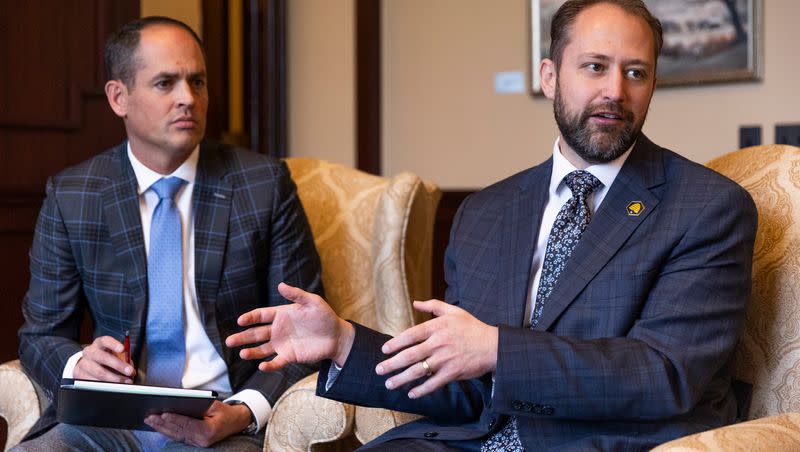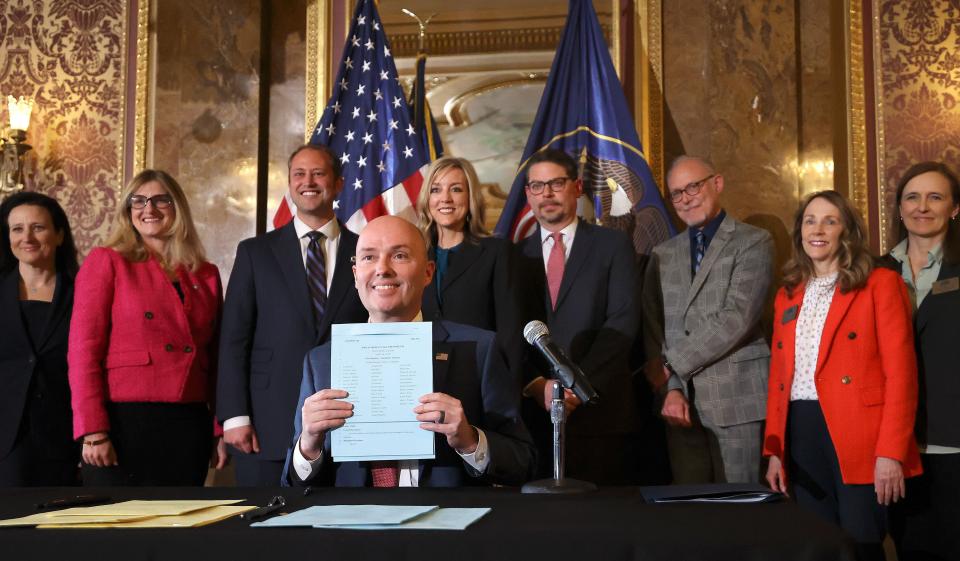The proposed changes to Utah’s social media laws are now public

Utah’s unique social media laws may change. Newly proposed changes would remove the automatic curfew scheduled to go into effect on Oct. 1 on children’s social media accounts and also require social media companies to enable the maximum default privacy settings on Utah children’s accounts.
The amendments were made public Monday morning. Sponsored by Rep. Jordan Teuscher, R-South Jordan, and Sen. Mike McKell, R-Spanish Fork, the Social Media Regulations Act Amendments make changes to the previous bills.
SB194 and HB464 are the bills that contain the proposed changes.
“Our number one goal is to protect minors from the harmful impacts of social media,” Teuscher said in a release. “HB464 and SB194 put important safeguards in place to protect Utah’s children and gives social media companies time to comply. Utah will continue to lead the nation in finding innovative solutions to complex challenges.”
HB464 would give children and their parents legal recourse for harms caused by “a social media company’s algorithmically curated social media service.” The bill also establishes defenses for social media companies and states that they may not be held liable “based on the content of material posted by users of the algorithmically curated social media service for declining to restrict access to or modify user posts based solely on the content of those posts.”
Additionally, the bill would allow social media companies “to legally overcome the assumption that their products cause harm if they obtain parental consent for a minor’s use of the platform, remove addictive features and display content chronologically and limit a minor’s time on the platform,” a release about the bills stated.
SB194 would require social media accounts to verify the ages of their users through an approved system. Additionally, the bill would give parents or legal guardians supervisory tools such as the ability for an individual set by the Utah minor account holder to set time limits for daily social media usage, schedule mandatory breaks as well as view data showing how much time the person spent on the social media account.
The laws would restrict children’s account visibility, disable search indexing of children’s accounts, restrict Utah children’s accounts so that they can only direct message other connected accounts as well as “implement and maintain reasonable security measures, including data encryption, to protect the confidentiality, security, and integrity of a personal information collected from a Utah minor account holder,” the bill stated.
“We won’t stand by while social media companies continue to exploit kids,” McKell said. “Social media companies know the harm they are inflicting on our youth’s mental health — and we’re not going to look away. Utah will continue to lead out on protecting youth and providing parents with tools and resources. This is an unprecedented issue we’re dealing with, and it requires novel legislation.”
The differences between the original bills and these amendments deal primarily with parental controls and age verification.
Age verification would be done using an approved system if the bill passes. Additionally, the bills do not state that parents or guardians need to give consent to Utah children to have social media accounts. Furthermore, the default curfew setting is no longer contained the bill. Instead, the bill would give supervisory tools for parents and legal guardians.
While the language around age verification did change, the bills still retained an age verification component. In addition, the laws would also prevent social media companies from sharing or selling children’s data without verifiable parental consent. The laws would still establish privacy settings for children’s accounts. Social media companies would be required to enable a default robust privacy setting.

When Gov. Spencer Cox signed the original version of the act, he called them “first of their kind bills in the United States” and said it was “huge that Utah is leading out on this effort.”
“We have lots of states that are interested and I know we’re all having conversations with other governors, other legislators and other states,” Cox continued. “I suspect that you will see lots of bills like these moving forward.”
Changing the bill was something Teuscher said was anticipated as they told social media companies they’d be willing to work with them.
Related
“One of the things that the social media companies were asking for is they said, ‘We understand the harm and we want to be good actors, but the bills don’t necessarily give us a path to a safe harbor if we do X, Y and Z,’” Teuscher said in a phone interview, explaining that lawmakers anticipated working with the companies in the interim session. And they also wanted to see what happened across the nation.
It was why Sen. Kirk Cullimore, R-Draper, introduced a bill that delayed implementation from March 1 to Oct. 1. It was the first bill Cox signed this session.
“As a father of six children, I have seen social media’s negative impact on kids firsthand,” Cullimore said. “We’ve shown time and time again that Utah deeply cares about youth mental health. We’re committed to getting this right and finding ways to protect our youth from dangerous algorithms, data collection and the overall detrimental effects of social media.”

